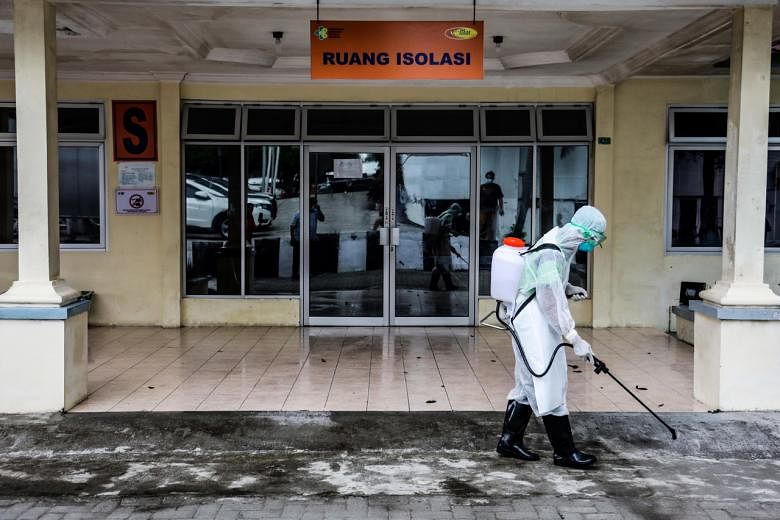At the Gatot Subroto Army Hospital in central Jakarta, news that the government is introducing rapid testing for the coronavirus could not have come soon enough.
The hospital is one of eight tasked with testing and triaging patients with the respiratory disease.
Last Thursday, a small Z-shaped corner carved out of an out-of-the way wing at the back of this sprawling complex was bursting at the seams. This is where testing for the coronavirus takes place.
At midday, more than 60 people had occupied nearly all the seats in the waiting room - an area measuring less than 100 sq m.
All new entrants were directed to add their names and contact information to a list that indicated the next available slot was on April 11, and even that slot was filling up fast. Already, 53 names were on the list and presumably ready to pay the 750,000 rupiah (S$68) for a test.
Not everyone had to wait.
Mr Wardana Mulyoputra, 44, said he pulled strings with friends high up in the military to jump the queue.
The wine importer and his wife have two young children as well as the couple's mothers, aged 56 and 79, at home. "It's so difficult to get a test. I couldn't take the chance of waiting," Mr Wardana said.
Indonesia's government is struggling to contain the outbreak in the vast archipelago, the world's fourth-most populous country. As of yesterday, there were 514 cases, while the death toll had risen to 48.
Earlier this month, President Joko Widodo encouraged Indonesians to stay home and closed schools as well as popular landmarks like the National Monument in Jakarta. Still, businesses and neighbourhood mosques remain open.
The soft touch reflects a country with a meagre social safety net, where the vast majority of the working-age population earns its living from the informal sector as housekeepers and ride-hailing drivers.
"Indonesia is different from other countries," said IT consultant Rinaldi Napitupulu, 56. "Here, if you don't work, you don't eat."
Indonesia's healthcare system was already creaky before the onset of the pandemic. Care is limited outside the big cities. The universal health insurance scheme ran a deficit at the end of last year of 13 trillion rupiah.
Still, rapid testing represents a big step forward. Tests to date have included chest X-rays, blood tests, and nose and throat swabs.
"Jokowi has been trying to balance calls for tougher measures to stop the spread of Covid-19 against the need to protect jobs and incomes for many fragile Indonesians," said analyst Ben Bland, director of the South-east Asia Programme at the Sydney-based Lowy Institute, using Mr Joko's popular name.
"The government now seems to be stepping up its response, which is much needed because Indonesia's hospital system was already overstretched and underfunded."
Even so, the country is far behind its neighbours. Ms Annisa Mutia, 23, booked a test soon after arriving from Malaysia as she had a dry cough - one of the symptoms of Covid-19. She could not help comparing Malaysia's response last week to close businesses and ban international travel with her own country's more relaxed approach. "Indonesia isn't prepared for this," she said.

